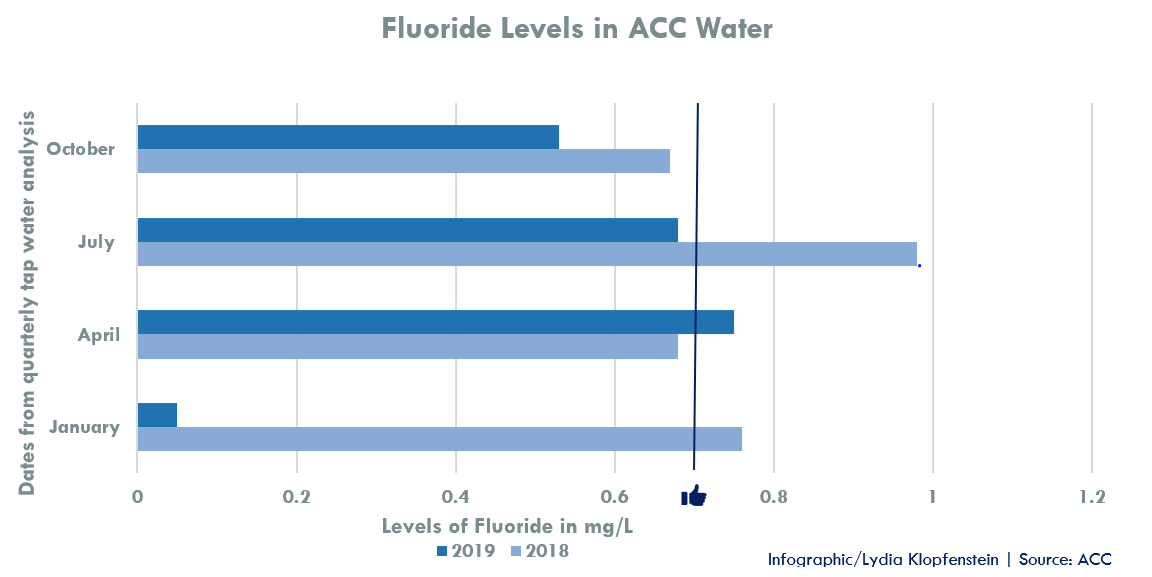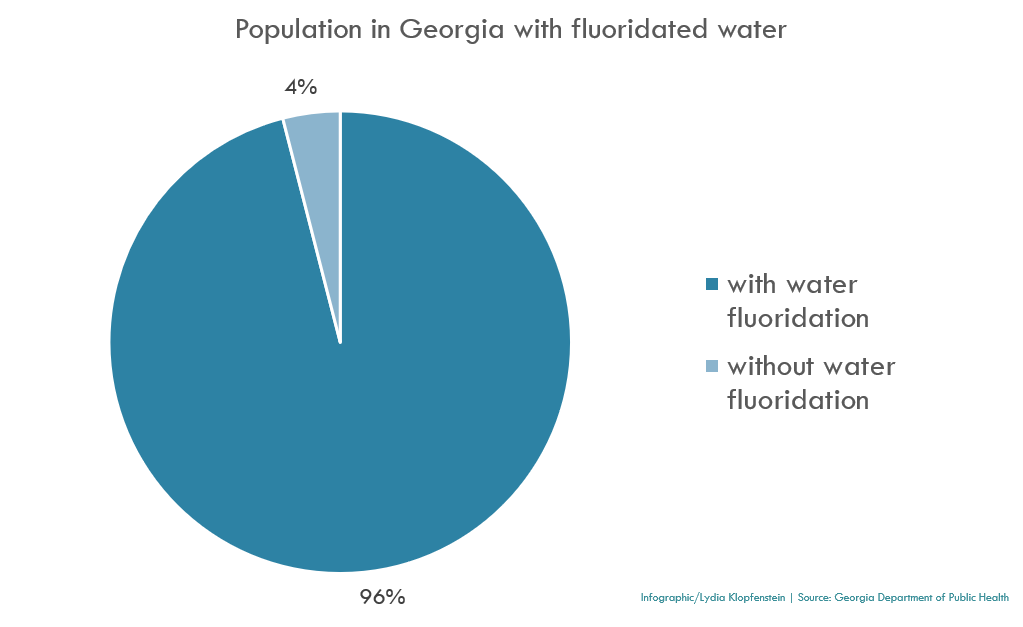Fluoride is a natural substance that is released from rocks into the water, air and soil. According to the Centers for Disease Control and Prevention, there is not enough natural fluoride in our drinking water to prevent tooth decay.
Dental decay became a huge debate during WWII when many individuals were getting rejected from the military because they didn’t have enough teeth. Shortly after the war, the CDC suggested we add more fluoride to our public water systems to promote oral health and prevent cavities, which would also save people money.
According to the fluoridation census of 1993, Athens-Clarke County was the first county in Georgia to provide community water fluoridation in May 1951.
Several working professionals in the county, however, are against water fluoridation because they believe it can cause more harm than good, including Sydney Bacchus who has a doctorate in hydroecology. Bacchus believes feeding fluoride into our public drinking water is an act of contamination.
Georgia’s fluoridation statute only allows certain counties to opt out of water fluoridation if a petition is signed by 10% of registered voters.

Why It’s Newsworthy: The Georgia Department of Public Health says one of the most effective ways for decreasing dental decay is by providing community water fluoridation, but not everyone agrees with putting fluoride in public drinking water.
The Rise of Dental Fluorosis
On July 18, 2018, the routine tap water analysis for Athens-Clarke County water showed a fluoride level of 0.98 mg/L. Some may consider this level relatively unsafe considering the CDC recommends only 0.7 mg/L. If children are exposed to high levels of fluoride then they are more likely to develop dental fluorosis, which can be an unwanted health effect of water fluoridation.
John Ohalloran graduated from the University of Georgia in May 2019 with a Bachelor’s degree in ecology. He is against water fluoridation because he believes humans are messing things up by tampering with natural resources.
“I think they put too much [fluoride] in there. I could understand a little bit and it’s not bad for you in low concentrations. But they overdue it, and it has become a health concern if you have too much,” Ohalloran said.
Dental fluorosis is a deficiency of tooth enamel caused by too much fluoride intake as a child. According to the Fluoride Action Network, dental fluorosis rates have gone up since community water fluoridation was introduced in the 1950s. A study conducted by the CDC from 1999-2004 confirmed the increased dental fluorosis rates. Children aged 12-15 had a higher prevalence of dental fluorosis in 1999-2004 when compared to the same aged children in 1986-1987. In fact, the rates almost doubled.

Dr. C. Rhett Jackson is a graduate coordinator at The Warnell School of Forestry and Natural Resources at UGA. He has a PhD in hydrology and conducts transdisciplinary investigations of water issues. Jackson believes people who oppose water fluoridation are “like anti-vaxers” because we have been doing it for years, and it has been regulated in safe amounts.
“The thing is, everything has negative health effects at high dosages, even water itself. If you woke up tomorrow, drank three gallons of water, and didn’t seek medical attention, you’d be dead by 11 a.m.,” Jackson said.
Safe Levels of Water Fluoridation
According to William Cottrell, the operations coordinator for Athens-Clarke County water treatment, the water systems in the county are required to feed fluoride by the state.
“Our treatment goal is 0.7 parts per million (ppm) which is a very low dose long considered safe,” Cottrell said.
Water fluoridation reports use both ppm and mg/L because 1 ppm is approximately the same as 1 mg/L. The CDC used to recommend a level of 0.7 to 1.2 mg of fluoride per liter of drinking water, but this level has been updated and replaced to 0.7 mg/L instead.
The CDC reports we have access to more products with fluoride than we used to when water fluoridation was nationally implemented in the 1960s. The CDC has lowered the level of fluoride in our water because of these products.

Jay Dayton is a pharmacy student at UGA who believes water fluoridation works because it does exactly what it’s supposed to do—protect our teeth.
“We have much better teeth than most countries, and most countries don’t have fluoridated water,” Dayton said.
Although the U.S. is one of the top 10 countries with the best dental health, there are still eight other countries ahead of the U.S. on that list, including Germany and Mexico which don’t have fluoridated water.
Children and Dental Hygiene
Todd C. Rasmussen is a hydrology professor at UGA. He has been a member of The American Water Works Association, a nonprofit organization dedicated to providing safe and clean water, since 1980. Rasmussen believes people should rely on much more than the fluoridation of water to keep their teeth healthy.
“… fluoride in drinking water does not guarantee healthy teeth. Yearly dental exams, regular brushing and flossing, and a healthy diet (low in sugar and acid that attack tooth enamel) promotes healthy teeth,” Rasmussen said.
So, what about children who can’t afford annual visits to the dentist and/or nutritious food?
Nationally, children are four times more likely to develop cavities than be diagnosed with asthma or hay fever. The Department of Public Health also noted that children with a lower socioeconomic status are more likely to experience untreated tooth decay than those of a higher socioeconomic status.
Athens-Clarke County has a drastically higher poverty rate when compared to the rest of Georgia. According to Welfare Info, about 46% of children in grades 1-4 live in poverty in the county, along with 41.8% of middle schoolers and 33.6% of high schoolers. If children don’t have regular access to a dentist, then the fluoride in their drinking water is essential for their oral health.
The Future of Water Fluoridation
People have been drinking fluoridated water for over 70 years, and it is very helpful in certain communities. But people need to be educated so they know whether they’re ingesting too little or too much. Research has shown that water fluoridation decreases the number of cavities, but also increases the chance of developing dental fluorosis.
“People on the political fringes, both right and left, have often viewed fluoridation as some sort of government conspiracy, usually mind-control,” Jackson said.
People like Bacchus and Ohalloran continue to oppose water fluoridation, but they don’t see it as a government conspiracy like Jackson suggests. They just don’t think it’s necessary when there is a natural amount of fluoride in water already, along with products like toothpaste and food items.
Public drinking water in Athens-Clarke County has been fluoridated since May 1951, and it goes through a careful, step-by-step process as it travels from the source to the tap. The water conservation staff offer tours and educational programs to both children and adults who want to learn more about how the county water system works.
For more information about these tours and programs, contact Jackie Sherry through the Athens-Clarke County website.
Lydia Klopfenstein is a senior majoring in journalism at the Grady College of Journalism and Mass Communication at the University of Georgia.








Show Comments (0)